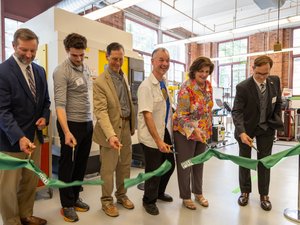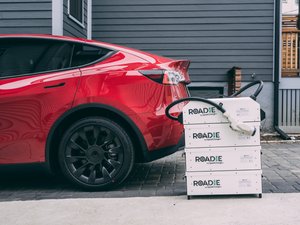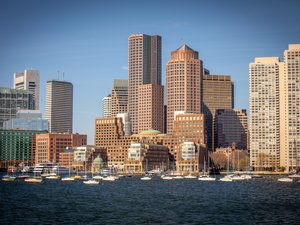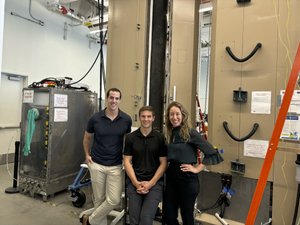Learn more here: Meet The New Boston Speaks Up Logo: We celebrate diversity, and demand better access to opportunities for underrepresented people.
AK Ikwuakor, also known as “Coach AK,” is an entrepreneur, educator, consultant, strategist, storyteller and former Top 10 world-ranked athlete from the University of Oregon (hurdles, 400 meter).
Ikwuakor has founded several companies, including Empower2Play, a sports diplomacy project working with the U.S. government, and ELETE Styles, a made to measure clothing provider for athletes and working professionals.
He’s traveled to more than 30 countries to work with students, athletes, coaches, governmental agencies, celebrities, victims of terrorism and CEOs.
Originally from Colorado, Ikwuakor has made Boston his home for the past decade. Much of his work aims to foster cross-cultural relations and maximize economic development in under-resourced communities through the power of sports and education.
Boston Speaks Up · 046: Entrepreneur-Coach AK Ikwuakor
Pre-podcast Q&A below:
What does AK stand for?
Akobundu Ikwuakor
Where were you born?
Wheatridge, Colorado. I am a first generation Nigerian-American. My parents are from NIgeria and moved to Golden, Colorado in 1976 because my dad received a scholarship to pursue his PHD at The Colorado School of Mines.
How would you describe your childhood?
I didn’t grow up in a diverse environment. Outside of my family, there weren't a lot of people that looked like me. I had to navigate different worlds. At home I was Nigerian, in the community I was black, but with other black people I wasn’t black enough.
Your father was a veteran. How do you think that’s helped shape your worldview?
My dad fought in the Nigerian/Biafran war. I actually didn’t get his thoughts on his military experience until only a few years ago. My dad is a very humble, even keeled, and mentally strong individual. My father is my hero.
What was your relationship with your parents growing up?
My family is very close. They were strict growing up, but would do everything for their family. I wasn’t the best kid growing up, but they always believed in me. Faith, education and integrity were top on their list.
What was it like being the youngest of triplets and the triplets being the youngest of 6 children?
Honestly, I don’t know any different. When we grew up we were always in the same classes and I was often confused with my twin brother. We also have three older brothers outside of the triplets. When growing up, each of my older brothers took us under their wing and looked after us. They didn’t always do a good job. HAHA! They often made us do their chores and didn’t allow us to play video games. Now though, we are all on the same Wechat family group and talk daily.
What is your first memory of encountering racism?
My brother, sister and I got racially discriminated against on a daily basis.The memory that sticks with me the most, even today, was a situation during my junior year in high school where I received a Christmas card from two students, one being the principal’s daughter, that was a drawing of a black man hanging from a tree and read, “Happy Kwanzaa.”
You’re 6’ 3” and 220 pounds, and a former high-performance athlete. You recently explained in a LinkedIn video that you feel safe walking to your car, but have there been scenarios when you’re traveling around America or the world where you’ve feared for your safety because you’re black?
I have been pulled over by police probably over 70 times. A number of those situations involved my having to calm the officer down, while his hand was on his hip, because I had a scented air freshener in my rearview mirror. Yes, it’s happened more than once due to a hanging air freshener.
What led you to Oregon University?
My brother, sister and I received athletic scholarships to run track and field at the University of Colorado. I ended up transferring to the University of Oregon after my freshman year because they refused to increase my scholarship after an All-American season.
Did you find Oregon University accepting?
College was the first time I felt accepted. I had a great group of training partners and we are still good friends today.
What about Boston? Was there ever a moment where you found it unaccepting?
I feel I have been able to navigate Boston pretty well; the startup scene mostly. The only places I have felt out of place are the academic institutions. My girlfriend received her PHD from MIT, and I was around that circle a lot. Very different world than I am used to even though I used to work at boarding schools for 4 years (Phillips Exeter Academy and the St Paul’s School).
How would you describe the defeat of narrowly missing out on the 2008 Olympics?
It’s a sensitive subject. HAHA! I just know what it feels like to reach a lifelong dream, as well as, the feeling of losing it all.
Your daughter has a beautiful name, Haiven. Where does the name come from?
My ex-wife thought of it. We have also connected it to Safe-Haven. My daughter has saved me from myself on so many occasions.
When did you make your first entrepreneurial plunge and why?
I don’t define entrepreneurship as only when someone is starting a business, but rather when someone decides to live and create life they imagine. For example, my brother is an actor in Hollywood. I consider when he decided to drop everything and move to Hollywood as starting his entrepreneurial journey. For me, my first jump was deciding to train for the Olympics. My first business venture was Empower2Play back in 2012.
Can you describe how Empower2Play worked and how it invested in the development of youth leaders?
Empower2Play (E2P) was a sports diplomacy and youth empowerment organization. Our model was to host multi-day international sports camps in under-served communities to foster cross-cultural relationships and identify future leaders through the introduction of unfamiliar sports in their community. Every event we co-facilitated with the community members utilized only the resources within the community (food, volunteers, equipment, etc.,) The only thing we brought was the sporting equipment.
How did Empower2Play become a sports diplomacy project with support of the US Government?
Networks and connections (Philippines). In Haiti, we were able to capture footage in immersive VR of a neighborhood that the US State Department didn’t even have. That video locked the funding and the partnership.
Are their lessons from the Empower2Play program that can be deployed today to help enable more black youth to grow into and assume positions of power in business and politics?
Yes, the most important life skills I would push on youth through my experience leading E2P are access, integrity, and networking. Oftentimes, youth are afraid to ask for help or to reach out to people that don’t look like them. This is a huge mistake! You will only grow as strong as your network.
What sorts of challenges do you face as a black entrepreneur?
Honestly, I will never know for sure what decisions were made or not made because of my race. I just know that I have to be comfortable and able to thrive in environments where no one looks like me. Oftentimes the biggest roadblock is the one I put on myself mentally.
Your Unbranded framework includes an exercise to help unpack people to better showcase the incredible complexity of each individual human. When did you develop your Unbranded framework?
The framework was developed 2 years ago when I was asked to lead a session on “honesty” for a speaking series called Creative Mornings. This was the first time I formalized this process with the moderator, Sophia Moon. The ideology though has been a lifelong process.
At this moment in time, who in Boston would you most like to conduct your Unbranded workshop with?
Marty Walsh. Most people only see him as the Mayor of the city, but from my many conversations with him, he is a person that is multi-layered. I think the Unbranded process would provide listeners a different perspective on who he is truly as a human.
What are the “boxes” people most commonly define you in that bother you the most?
I am bothered anytime when someone tries to try to understand my entire being from a single box. I am not just one box, but all of them.
In light of recent events sparked by the death of George Floyd, why have you decided not to protest and how are you instead focusing your energy?
For one, I am a father and don’t want to put myself in an unfortunate situation. Anything can happen and I don’t want to risk it. I believe we each have a lane we can take when it comes to social injustice. The lane I have taken is through content writing, interviews, initiating conversations with people who are now becoming aware, and mentorship.
What’s your advice to people looking for hope and optimism in light of the great racial injustices that still exist in June 2020?
People are becoming aware. Momentum is moving in the right direction.
###
You can follow BSU on Twitter at @BostonSpeaksUp and discover more inspiring stories at the Boston Speaks Up blog and recommend BSU guests by contacting bostonspeaksup@gmail.com.








